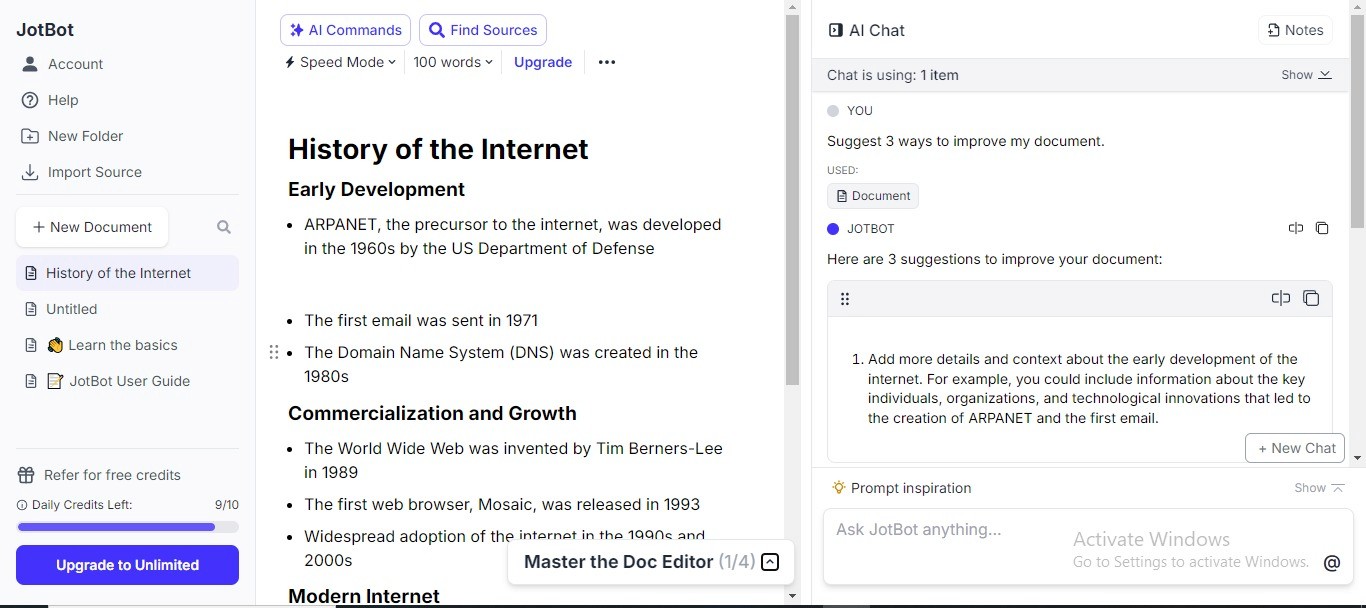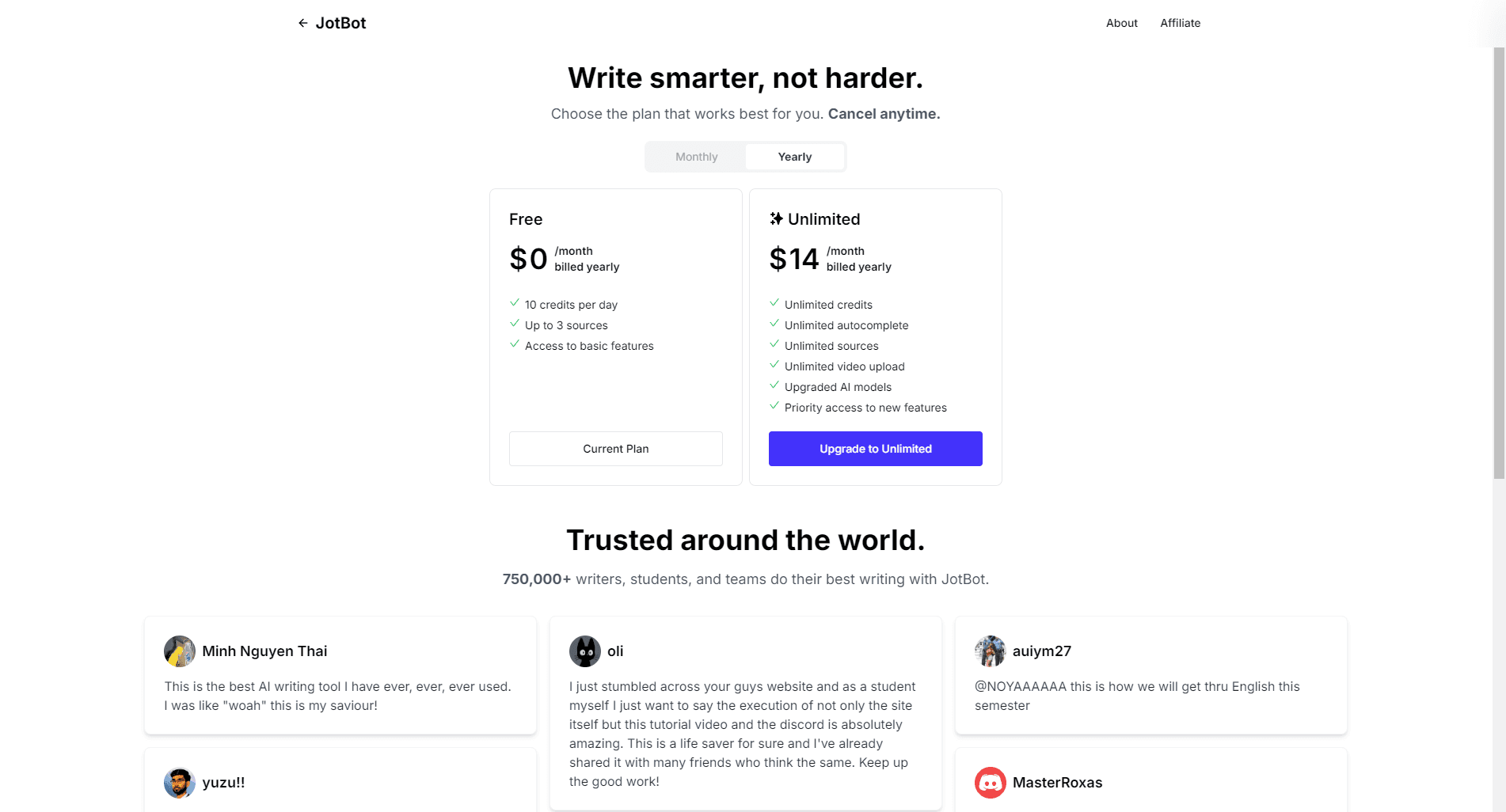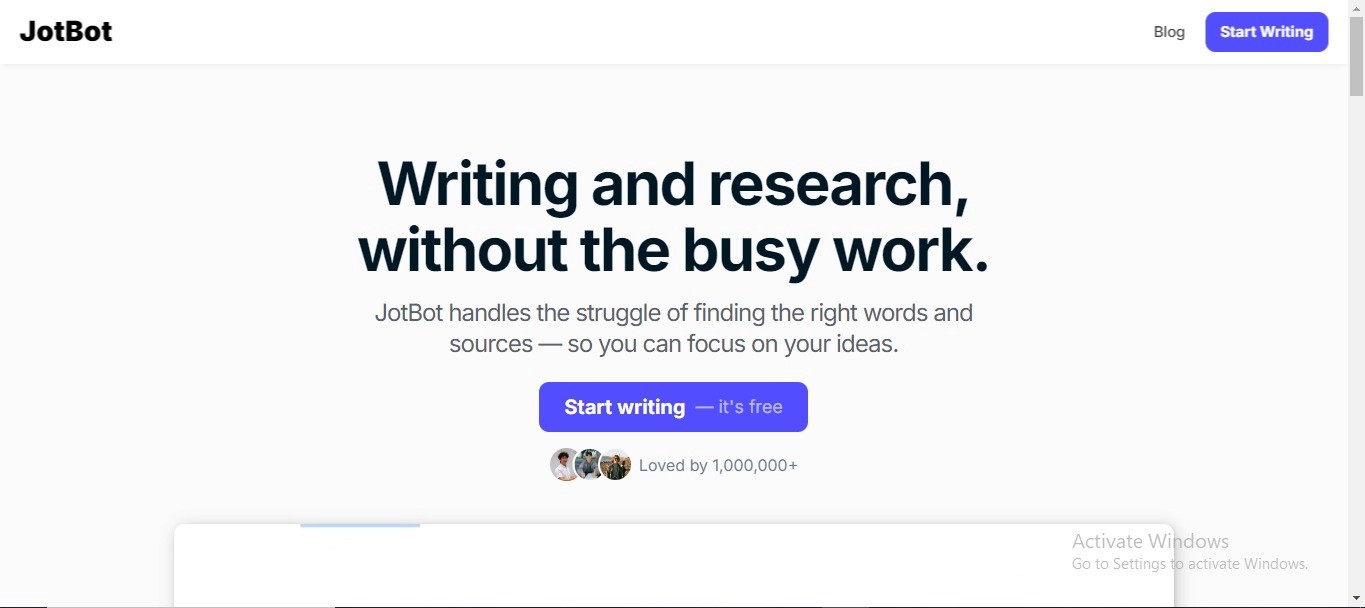< Back
The Best 10 AI For Literature Review In 2024
Declan Gessel
Sep 16, 2024
Consider you staring at a blank screen, knowing you need to find sources for essay, but the sheer volume of material is overwhelming. We've all been there. The pressure to compile a thorough literature review can feel insurmountable. But what if there was a way to streamline the process? Enter AI tools for literature reviews designed to help you quickly locate and organize sources. In this guide, we'll explore the best options available in 2024.
Jotbot's solution, source finder, is a must-have for anyone looking to find sources for essays on AI efficiently. Its intuitive interface and powerful search capabilities can help you achieve your goals, such as discovering the best AI tools for literature reviews.
Table Of Contents
Common Pitfalls When Using AI Tools for Literature Reviews and How to Overcome Them
Write Smarter With Jotbot's Source Finder — Start Writing for Free Today
The Role of AI Tools in Literature Review

Conducting a literature review involves no walking in the park. Researchers face a maze of challenges right from the start, and finding credible sources is often the first hurdle. You must conduct systematic searches across various databases, using appropriate keywords and filters to identify reliable and relevant literature.
Evaluating the credibility of sources is essential. It involves assessing the author's credentials, publication date, peer-review status, and research methods used in the studies.
The Art of Summarizing Research
Once you’ve got your sources, summarizing research can be overwhelming. You have to extract key findings, identify patterns, and summarize diverse perspectives without introducing bias. This requires critical thinking and analytical skills to ensure the synthesis is coherent and logically structured.
Wrangling Citations and Staying Objective
Organizing citations is another significant challenge. You must keep track of numerous sources, ensure proper citation formats, and avoid plagiarism. This often involves using reference management software to streamline the organization and retrieval of sources. Maintaining objectivity is crucial, too. You must present a balanced view of the literature, avoiding personal biases and ensuring that all relevant perspectives are considered. This can be particularly difficult when the literature presents conflicting findings.
Finding Gaps and Keeping Up
Recognizing gaps in the research is a critical aspect of the literature review process. It requires a deep understanding of the field and the ability to reflect critically on the literature to propose future research directions. In rapidly evolving fields, staying current with new research is essential. You must regularly update your literature reviews to include the latest studies, which can be time-consuming and require ongoing engagement with the literature.
Let AI Do the Heavy Lifting

AI tools have emerged as valuable resources in addressing these challenges. They can automate the search process, quickly sifting through vast databases to identify relevant studies based on specified criteria. Some AI tools can assess the credibility of sources by analyzing citation patterns, peer-review status, and author impact. This feature helps researchers prioritize high-quality studies for inclusion in their reviews.
Streamlining Data Extraction and Collaboration
AI can assist in extracting critical findings from research papers and summarizing them into concise formats. This capability allows researchers to quickly grasp the main points without reading entire articles. Many AI tools offer collaborative functionalities, enabling researchers to share annotated documents and references with team members. This fosters teamwork and collective input in the literature review process.
Identifying Trends and Automating Citations
Advanced AI algorithms can analyze large volumes of literature to identify trends, patterns, and gaps in research. This analytical capability aids researchers in formulating research questions and hypotheses. AI tools simplify the citation process by automatically generating citations and bibliographies in various formats. This reduces the risk of errors and saves time during the writing process.
Keeping It Current
Some AI tools offer alert services that notify researchers of new publications in their field of interest. This ensures that literature reviews remain current and comprehensive. AI can create interactive summary flashcards highlighting essential information from research papers, allowing researchers to skim through content efficiently and focus on crucial points before reading deeper.
Related Reading
• How To Find Good Sources
• Using AI For Research
• Citing ChatGPT
• How To Find Academic Sources
• How To Cite AI In MLA
• AI For Research Paper Writing
• Essay Sources
• AI In Academic Writing
• Most Reliable Sources For Research
• How To Get ChatGPT To Cite Sources
Criteria for Choosing the Best AI for Literature Review

Functionality: The Basics of Selecting AI Tools for Literature Review
When choosing AI tools for literature reviews, functionality is your first stop. Begin by listing your needed features: literature search, citation management, summarization, and collaboration. Visit the tool’s website to explore its features and check out user manuals or demo videos. This groundwork helps you understand what the tool can do.
User-Friendliness: Keep It Simple and Intuitive
You want a tool that doesn’t make your brain hurt. Sign up for a free trial or demo if you can. Navigate the interface and see if it feels natural. Note how easy it is to get started. An intuitive tool means less time learning and more time working.
Integration with Existing Systems: Make It All Work Together
Identify the software you already use for research and writing. Check the AI tool’s website for integration options. Look for compatibility with reference managers like Zotero or EndNote. User feedback, offering real-world integration experiences, is gold here.
Cost: Balancing Features and Budget

Know your budget. Visit the AI tool’s pricing page and compare tiers. See what features each tier offers. Look for discounts for students or academic institutions. A tool shouldn’t break the bank but deliver what you need.
Support and Resources: Help When You Need It
Assess the level of support available. Check the website for a help section with tutorials, FAQs, and user guides. Test customer support by sending a query. Fast, helpful responses can make a world of difference.
Reviews and Recommendations: Learn From Others
Search for reviews on academic forums and software review sites like G2 or Capterra. Join academic groups to ask for recommendations. User experiences can reveal a tool's effectiveness and reliability.
Data Security and Privacy: Protecting Your Information
Understand how your data will be handled. Review the AI tool’s privacy policy and terms of service. Look for data encryption and compliance with regulations like GDPR. Check for backup and recovery options.
Updates and Improvements: Staying Relevant
Investigate the tool’s update history. Look for a blog or news section that discusses updates and new features. User forums can be insightful for recent changes. A regularly updated tool is a good sign of ongoing improvement.
Customization Options: Tailor It to Your Needs
Determine if the tool can be customized to fit your needs. Explore settings during your trial for options to create custom categories or tags. Review support materials for customization features. The more you can tweak, the better it’ll fit your workflow.
Trial Period: Test Before You Commit
Use any available trial period to dive into the tool. Test all the features you need and assess their performance. After the trial, reflect on your experience. Did the tool meet your criteria? This hands-on time is invaluable for making a final decision.
Join the growing community of over 500,000 writers, students, and researchers transforming their writing experience with Jotbot. Discover how Jotbot's AI writing assistant can help you write more thoughtfully, not harder—sign in with Google and get started today!
Top 10 AI Tools for Literature Review in 2024

1. Jotbot: The All-in-One AI Writing Assistant

Jotbot is a comprehensive tool offering more than just text generation. It streamlines the writing process with AI-powered note-taking, summarization, and citation features. Need to find credible academic sources? Jotbot's got you covered. It can even generate outlines and full-length essays. It's perfect for students and researchers who want everything in one place.
2. Semantic Scholar: Discover the Right Papers
Semantic Scholar is your go-to for finding research papers that matter. It uses AI to recommend documents based on what you're interested in. With smart filters, you can narrow down results by publication date or relevance. Plus, it gives insights into how often papers are cited and in what context. This is a must-have for academics and students conducting thorough literature searches.
3. Elicit.org: Automate Your Literature Review
Elicit.org is all about efficiency. It automates summarizing research papers so that you can grasp key findings quickly. It also helps you organize research questions, findings, and notes in one place. With customizable templates, you can efficiently structure literature reviews and research proposals. If you want to automate repetitive tasks, this tool is for you.
4. Enago Read: Make Sense of Complex Papers
Enago Read enhances your reading experience by summarizing complex papers and providing insights. It offers personalized research recommendations based on your preferences and reading history. Plus, you can highlight and annotate PDFs for easy reference. Researchers and students who frequently read academic papers will find this tool invaluable.
5. Consensus.app: Quick and Easy Study Insights
Consensus.app is an AI-powered academic search engine that quickly finds studies and extracts critical findings. It summarizes findings from multiple papers, saving you time in literature reviews. With its user-friendly interface, you can easily navigate and access information. This tool is ideal for researchers who need to quickly gather insights from many studies.
6. Scite.AI: Understand Research Relationships
Scite.AI provides innovative citations that analyze how papers are cited in other research, showing whether they support, contrast, or mention the original study. It also provides context for citations, helping you understand the relevance of each source. With visual citation maps, you can see the relationships between papers. This is great for researchers who want to know how studies relate to one another.
7. AskYourPDF: Interactive PDF Exploration
AskYourPDF is an AI-powered assistant that generates outlines and summaries from PDF documents. You can ask questions about the content, and the AI will answer based on the text. It also allows you to annotate and search through your notes efficiently. If you work extensively with PDF documents, this tool will help you extract and organize information interactively.
8. SciSpace: Collaborative Research Made Easy
SciSpace uses AI to refine search results based on user behavior and preferences. It offers interactive visualizations of research trends and relationships. You can share workspaces and edit documents with your team through collaboration features. Researchers working in teams will appreciate this platform for joint literature reviews and data analysis.
9. Iris AI: Discover New Research Connections
Iris AI uses a unique algorithm to find relevant papers based on the research contexts you define. It visualizes connections between documents and topics, making it easy to explore related research. Personalized recommendations suggest articles that align with your research interests. Researchers looking to explore new areas of study will find this tool beneficial.
10. Connected Papers: Visualize Your Research
Connected Papers generates visual graphs that illustrate the relationships between research papers. You can explore documents in a network format, making identifying key studies and trends easier. With a user-friendly interface, you can easily navigate and explore research connections. This tool is perfect for researchers who prefer visual representations of literature.
Related Reading
• Reference Finder
• Best AI For Research
• How to Cite AI
• Websites Like Google Scholar
• AI That Cites Sources
• Best Academic Search Engines
• Best AI Tool For Research
• Academic Research Software
• How To Use Chat GPT For Research
• Best Research Tools For Students
Best Practices for Conducting a Literature Review Using AI

Start with a Clear Research Question
Kick-off by zeroing in on a solid research question. Define your research topic first. Pick something that aligns with your goals and narrows the search for relevant literature. Next, create a measurable question that ties into the existing body of knowledge. Set boundaries to keep your review focused. Write down that question and scope, and keep it in sight throughout the process. Regularly check in with your research question to ensure your search doesn’t wander off track.
Organize Sources by Themes or Concepts
Using tools like Jotbot can help you tag and categorize your sources. Select an AI tool for tagging and categorizing based on themes or concepts. As you gather sources, organize them into categories that reflect different aspects of your research question.
Use tags to label sources with keywords representing their main ideas, methodologies, or findings. Develop a consistent tagging system and apply it uniformly across all sources. Make a habit of reviewing and updating categories as you add new literature to keep everything relevant.
Validate AI-Generated Content
Cross-check AI-generated summaries and citations for accuracy. Review AI outputs to ensure they’re complete and accurate. Compare those summaries with the original research articles to make sure vital findings and nuances are captured. Establish a checklist for validating AI outputs, including accuracy, relevance, and completeness. Dedicate time to cross-reference AI-generated content with sources so you’re confident in the information you’re using.
Keep Up with New Research
Use AI tools with alert features like Litmaps to stay updated on the latest studies. Set alerts to notify you of new publications in your area of interest. Make it a habit to review these alerts weekly or bi-weekly. Create a schedule for reviewing alerts and incorporate it into your research routine. Maintain a separate folder or document for new studies relevant to your literature review.
Join the growing community of over 500,000 writers, students, and researchers transforming their writing experience with Jotbot. Discover how Jotbot's AI writing assistant can help you write more thoughtfully, not harder—sign in with Google and get started today!
Common Pitfalls When Using AI Tools for Literature Reviews and How to Overcome Them

Over-Reliance on AI Summaries: Checking the Source
Let AI do the heavy lifting, which is tempting, but don't skip checking the sources. AI-generated summaries are like CliffsNotes—they give you the gist but often miss the nuance. Remember to read the original paper, especially if the AI summary is crucial to your research. This will help you maintain accuracy and context in your work.
Inaccurate or Incomplete Citations: Get It Right
AI can falter with citations, leading to errors or omissions that could affect your academic integrity. Use dedicated citation tools within AI platforms to cross-check every citation. Manually verify these against the original documents and implement a verification checklist. This extra step ensures you’re building a solid foundation for your work.
Managing Data Overload: Organize Like a Pro
Dealing with a mountain of sources and summaries can get overwhelmingly fast. Use AI tools with tagging and categorization features to keep your research organized. Sort literature by themes or research questions, and regularly review and update your organizational system. This will help you stay on top of your research and prevent clutter from taking over.
Lack of Customization in AI Outputs: Speak Your Language
AI tools might only sometimes perfectly match the style or depth you need for your literature review. Opt for tools that allow you to customize prompts and adjust settings to match your desired output format. Experiment with different prompts to refine AI outputs and make them work for you.
Misinterpreting AI-Generated Insights: Trust but Verify
AI tools sometimes get the nuances right, especially in academic language. Pair AI with human judgment—read through AI-generated content carefully and refine it based on your understanding of the topic. Engage with peers or mentors to gain additional insights and perspectives. This will help you avoid misinterpretations and ensure your research is accurate.
Join the growing community of over 500,000 writers, students, and researchers transforming their writing experience with Jotbot. Discover how Jotbot's AI writing assistant can help you write more thoughtfully, not harder—sign in with Google and get started today!
Why Jotbot is the Top Choice for Literature Reviews

AI-Powered Features for the Modern Researcher
Jotbot integrates tools that make literature reviews easier. With AI note-taking, it transcribes key points from lectures or videos. This means you can focus on content without worrying about losing important details. It also summarizes long videos quickly.
For researchers relying on video content, this saves hours. Plus, Jotbot automates finding sources and creating citations. Enter keywords to access relevant studies, which is crucial for a thorough review. Additionally, it helps organize thoughts by creating outlines and generating drafts. This ensures a logical flow in your writing.
User-Friendly Interface for Researchers of All Levels
Jotbot's intuitive design makes it easy to use. The interface is straightforward, allowing seamless navigation through features. This makes it accessible for researchers at different levels, minimizing the time needed to learn how to use it effectively.
Saving You Precious Time
Jotbot shines in saving time. Automating repetitive tasks such as note-taking, summarizing, and managing citations lets you focus on deeper analysis and synthesis of information. This efficiency is invaluable in the fast-paced academic environment, where deadlines are often looming.
Ensuring Comprehensive and Accurate Analysis
Using advanced algorithms, Jotbot ensures that no relevant sources are overlooked. The AI-generated summaries are accurate and unbiased, providing a solid foundation for deeper analysis. This capability enhances the quality of literature reviews, ensuring that you completely understand the existing body of knowledge.
Collaboration Made Easy
Jotbot supports teamwork by allowing easy sharing of notes, outlines, and drafts. This is particularly beneficial for research teams working on collaborative projects, as it facilitates communication and sharing of ideas in real time.
Connecting with a Supportive Community
Jotbot links you with a community of researchers, providing opportunities for collaboration and support. This network is invaluable for sharing insights, discussing challenges, and gaining feedback on research projects.
Customizing Your Research Experience
Jotbot allows you to adjust settings to match your specific needs. Whether you modify the depth of summaries or tailor citation formats, it provides flexibility that accommodates different research styles and requirements.
Write Smarter With Jotbot's Source Finder — Start Writing for Free Today
Meet Jotbot, an AI powerhouse transforming how we write and research. This tool doesn’t just help with note-taking or summarizing videos; it’s a game-changer for sourcing and organizing your materials. Jotbot accurately identifies and finds citations and sources for your essays, streamlining your literature review process. Imagine having a tool that assists you in writing comprehensive outlines and even drafting entire essays.
Whether you’re a student, researcher, or part of a team, Jotbot is about making your writing process faster and more efficient. Sign up with Google, and you’ll be finding sources in seconds. With Jotbot’s AI writing assistant today, write more brilliantly, not harder.
Related Reading
• Elicit AI
• Scholarcy AI
• Scisummary
• AI Research Tools
• Sourcely
• Consensus AI Tool
• Mendeley Alternatives
• Cite This For Me Alternative
• Scholarly Sources Examples
• Academic Sources Examples
• How to Find Scholarly Sources
• List of Scholarly Sources
• Examples of Peer Reviewed Sources
• How to Cite a Book
• How to Cite an Article
• How to Cite
• How to Cite a PDF
• How to Cite Multiple Authors MLA
•How to Cite a Website in Text
• How to Cite a Lecture
• How to Cite ChatGPT
Write more, better, faster.
Your personal AI document assistant












